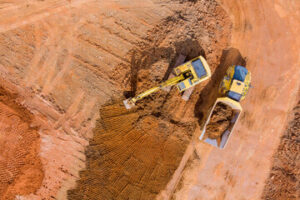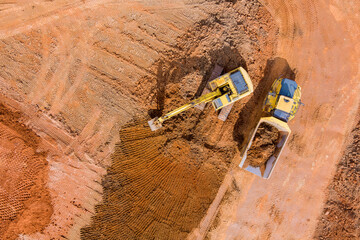Using heavy machinery, excavating contractors dig and prepare the landscape for construction projects. They may also install essential utilities like sewer, water, and electrical lines, as well as structural supports.
When choosing an excavation contractor, look for one who prioritizes safety, transparency, and cost efficiency. Ask about their equipment and technology, and ensure they’re licensed and insured. Reach out to Bar T Excavation, LLC for expert assistance.
Whether you’re building your dream home in the suburbs or a new commercial development in downtown Toronto, a strong foundation is essential for success. But before construction begins, the site must be carefully prepared. Excavating contractors are in charge of this initial phase, from clearing the land to digging the foundation. But this process is more than just shifting dirt around—it requires expertise and planning to ensure a successful project from the ground up.
Before any dirt is moved, excavation contractors conduct a comprehensive site survey to evaluate the terrain and soil conditions. This allows them to advise clients on how best to utilize the space and plan for any challenges that may arise during construction, from unforeseen issues like underground utilities to inclement weather.
Once the site is ready to begin work, excavation contractors dig trenches for utilities and shape the area around a building’s foundation. They also clear the land of any debris, making it safe and accessible for the rest of the construction team.
Excavating contractors are also a vital part of constructing roads and other large-scale infrastructure projects. They can dig, trench, and level the land, ensuring that the roads will be sturdy and long-lasting. Additionally, they can install drainage systems, directing water flow away from the construction area and decreasing the risk of flooding and other problems in the future.
In some cases, excavation contractors are called in to unearth and protect archaeological or historical artifacts from a site. This requires a delicate balance of skill and caution to avoid damage, but it is an important service that can help preserve the heritage of a community.
Many people assume that the job of an excavating contractor is simply to clear a site and dig holes, but this is only a small portion of their responsibilities. In addition to the actual labor, excavating contractors are responsible for planning and executing the entire excavation process. This includes conducting a site survey, developing a detailed plan, and obtaining necessary permits and approvals. They also monitor air and water quality during excavation to ensure the safety of workers and preservation of the environment.
Leveling the Terrain
Whether you’re building a patio, installing a pool, or adding a driveway, it’s critical to ensure that the ground is leveled. This will prevent issues like structural damage, poor drainage, and safety risks. A qualified excavation contractor will take the time to thoroughly assess the site and develop a detailed leveling plan. They’ll also be able to identify any underground utilities that may need to be considered.
Depending on the project, leveling excavation may involve clearing the land of debris, digging trenches, or removing soil. This work requires the use of heavy machinery, such as excavators or bulldozers. It also requires a high degree of precision. It’s important to choose an excavation company that has the right equipment and experience to complete this task.
Another crucial aspect of grading and leveling excavation is preparing the soil for landscaping. This process often involves addressing nutrient deficiencies and pH imbalances. It can also include a variety of other tasks, such as mulching, adding topsoil, or planting vegetation.
For larger projects, excavation contractors will often use a laser level to achieve a perfectly flat surface. This tool is ideal for identifying the desired elevation, and it can help them avoid mistakes and inaccuracies that could lead to future problems. In addition to laser levels, excavating contractors will usually have access to a number of other tools that can make the process more efficient. These tools include a tractor-mounted scraper, a dump truck, and a rake.
Once the ground is leveled, it’s important to consider the drainage system. Poor drainage can lead to water accumulation, which can damage plants and create breeding grounds for pests. Excavation contractors can install drainage systems that will ensure water is directed away from the landscape, preventing these issues.
Finally, it’s essential to find a company that will clean up the job site once it is completed. This is an important part of the excavation process, and many companies will offer this service as a standard part of their contracting services. Choosing a reputable excavation company will save you time and money, and it will help to prevent future problems with your landscaping or construction projects.
Integrating Vital Infrastructure
A construction project isn’t complete until the necessary infrastructure has been installed. This includes water, sewage and gas lines as well as electricity systems. Skilled excavation contractors can dig trenches or conduits to accommodate these systems and ensure they are integrated into the overall site. This helps prevent costly mistakes or unforeseen delays in the construction process.
This service goes hand in hand with grading, which is the final adjustment of a construction site’s terrain to meet its intended purposes. For example, a roadway must have an adequate slope to support its traffic load and be built on dense, compacted dirt with well-designed drainage. To do this, the excavating contractor must carefully grade the site using tools like earthmoving machinery and specialized equipment.
Additionally, the excavation contractor must address any other issues related to the site, such as erosion. They can use various techniques to control erosion and sediment movement, preventing pollution of water supplies or causing structural damage to buildings or roads. They also install physical barriers or rely on other means to mitigate mudslides and debris flows during wet weather, ensuring that construction continues without delay.
A quality excavation contractor knows that a construction site must be safe for workers and visitors. They will conduct a safety survey of the site and ensure that all existing underground utilities are properly identified. Additionally, they can perform soil tests to determine if the ground is suitable for a foundation. They can also remove any existing structures that aren’t in compliance with local zoning laws or have become unsafe.
Excavation contractors work with heavy machinery and must understand how to operate this equipment safely. They must also have sound legal knowledge and environmental expertise to ensure they follow proper procedure, avoid contamination and comply with regulatory standards. Choosing an excavation contractor with extensive experience and a strong portfolio of previous projects is key to ensuring your project’s success. Taking the time to assess their client references and a detailed project proposal can also help you make the right choice. Contact Limitless Golden Construction today to get a quote for your next excavation project!
Managing Underground Utilities
Whether working on a new roadway, building an underground sewage system or laying a foundation for a water treatment plant, excavating contractors must carefully manage the location of existing and active utility lines. Damage to buried infrastructure can cause service disruptions, cost extra money for repairs and increase safety risks for workers. In addition to coordinating with utility companies and using tools like ground-penetrating radar to identify utility locations, excavation contractors should conduct daily coordination meetings to review the site’s underground maps and discuss strategies for safely working around identified utilities.
An experienced and reputable excavation company should have extensive experience with the types of projects you need them to complete. Their portfolio of past projects and client references can give you insight into their expertise in the industry, as well as their commitment to meeting your specific project needs. They should also have a clear and concise project proposal that addresses all aspects of your work and includes a pricing structure.
When selecting a contractor, be sure to check their credentials, including licenses and insurance coverage. An excavation contractor that is bonded, insured and has completed the proper certifications is likely to provide quality and safe work. You should also ensure that they follow construction and safety regulations by having a written plan for their excavation activities.
Lastly, it is crucial to follow the “Call Before You Dig” process for all excavation projects. This national hotline will connect you with local utility providers who can mark the estimated location of buried utility lines before work begins. Additionally, a GPRS professional private utility locating service can accurately locate both public and private utilities in the field, provide detailed field markings, including depths, and even provide digital and PDF utility maps for your excavation project.
In the event that a utility line is damaged, an immediate response should be in place. This should include evacuating the area, shutting down equipment and notifying utility companies. Also, a detailed and timely incident report can reduce the impact of any damage to infrastructure and help to expedite repair and restoration.

